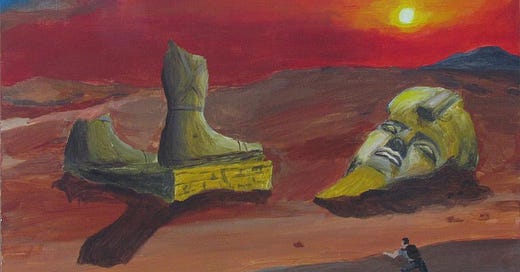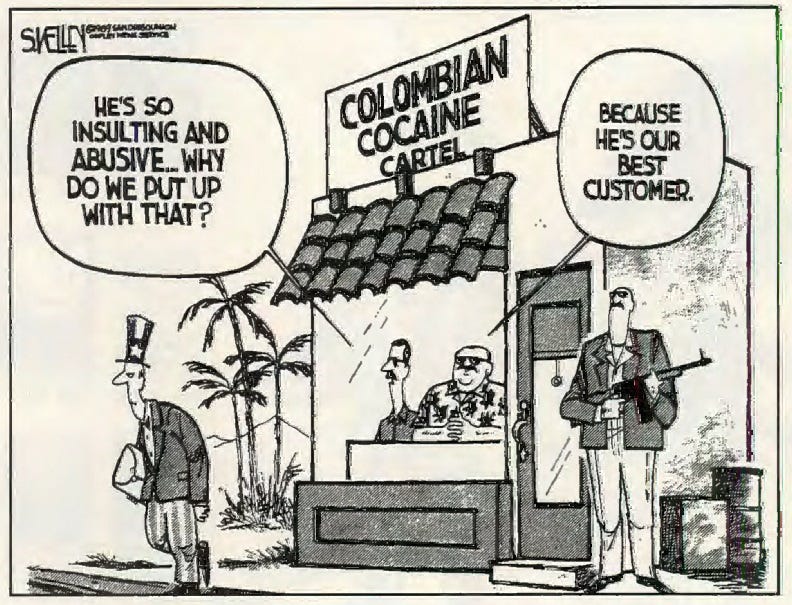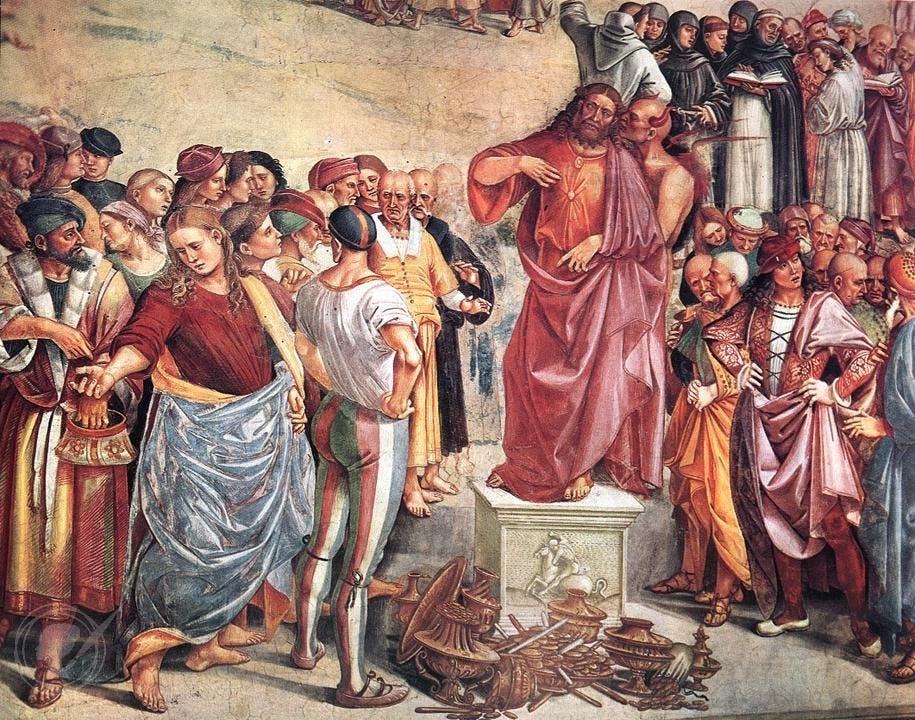Gravity's Rainbow - Part 3 - Chapter 19: Black Markets of Above and Below
Analysis of Gravity's Rainbow, Part 3 - Chapter 19: Slothrop Saved, to Swinemünde, Slothrop Meets der Springer, to Peenemünde, the Test Stands, von Göll Abducted, the Rescue Party Assembled
Slothrop, recently thrown off the Anubis during the storm, is saved by a child named Otto and his mother, the captain of this vessel, Frau Gnahb, two individuals participating in the black market within the post-WWII German Zone. The black market, though it has its many evil doers, sometimes also serves a purpose for the Preterite. For instance, while the Elites may use it to distribute psychoactive and addictive drugs or acquire weapons, the Preterite could use it to attain methods of self-defense or lifesaving medication that would not be given to them. Otto and Gnahb seem to represent the latter. As he dries off, he removes the tuxedo that was given to him by Stefania, ultimately severing his lingering tie with the Elite aboard that ship. But coincidentally, this mother and son are headed to the same destination (to Swinemünde) that Slothrop, Erdmann, and the rest of the Anubis were heading. So Slothrop asks, given the runners of black markets are typically in cahoots with each other, if they know of a der Springer. He directly quotes Geli Tripping since she was the first to tell Slothrop that Springer, in Swinemünde, could attain the Schwarzgerät for him. And of course they do know him, though it can be assumed that Springer would represent that former type of black marketeer.
As they are travelling down the coast, Slothrop realizes that the hashish he had procured from Potsdam was left on the Anubis, meaning it would be quite difficult, if not impossible, to get enough money to pay der Springer to procure the device. But he keeps this to himself, looking around the small vessel in hopes that the ship may still be in sight, putting back on the tuxedo which no longer has that perfect fit that it chanced to initially have, but instead was now “wrinkled and shrunken” (493). He is holding onto the fact that he was allowed within this stratum for a moment, and despite realizing his wrongdoing, does have some desire to remain within that class.
They arrive in Swinemünde and debark, making their way inland to what seems like a haven for black markets and their associated sellers. Atop the same spot which Geli said he would be on, stood der Springer. Slothrop flashes the white knight chess piece which Säure left for him in the basement where Pig Bodine’s printing press was stolen from, along with a note saying “Raketemensch! Der Springer asks me to give you this, his symbol. Keep it—by it shall he know you” (436, 3.12). They are finally introduced, and through some conversations, Slothrop puts together a number of facts which the reader, at this point, would have already known: that der Springer was another name for Gerhardt von Göll, the same man whom Erdmann had told him filmed her impregnation in Alpdrücken. Slothrop reveals the coincidence, telling von Göll that he was just with Erdmann and that he feared Bianca had jumped off the ship. Putting these facts to the side, Von Göll himself reveals the reason for his nickname, ‘der Springer’: his belief that while he does not hold as much importance on the surface as a king or queen, he, as a knight, can spring over any obstacle, while those supposedly more important pieces can only act in the two-dimensional space.
Von Göll is joined by Klaus Närrisch, the man whose name the Schwarzkommando extracted from Horst Achtfaden while he was ‘upon’ the Toiletship — though, really only on the ship in his drug induced hallucinations. The Schwarzkommando were attempting to extract information from Achtfaden regarding the Schwarzgerät: what it was used for, what it even was, and where it now resided. But given Achtfaden did not know — for, as he said, everything had been compartmentalized, and this was not his specific field of work or allowed knowledge — the Schwarzkommando were able to extract the name of someone who could tell them about it, that name being Närrisch. So, Närrisch now stands here, being one of the ‘Elite’ along with von Göll, who holds “by the neck an unplucked dead turkey” (495) while the poor and starving Preterite stand by and watch. Though, these two are more of an Elite class in the sense that they are Elite among those they surround themselves with, not a true capital-T-Them Elite. It is similar to how we saw von Göll believe himself superior to the kings and queens of the chess board — the true Elite of the Zone. They saw themselves as superior or on par with the kings and queens of the world, but they only really were when they were among pawns. Nonetheless, these two men are a part of this higher echelon, and as Slothrop comments on the how the two are treating the Preterite in a rather ‘shitty’ manner, von Göll describes that while it is a reasonable train of thought to despise the Elite and sympathize with the Preterite, the two must coexist or else there would be no real order. This is, as we have seen a number of Elite similarly do, another excuse and lie in order to maintain the order of things.
The group of them — Slothrop, Otto, von Göll, and Närrisch — walk up the coast to see a circus. On this walk Närrisch has become slightly suspicious of Slothrop’s reason for being here. As they walk, they also see Otto’s mother throwing insults at one of the many chimpanzees who are here for the circus. And in time, the lot of them, chimpanzees, Haftung (the circus leader), and Frau Gnahb included, get back on Gnahb’s boat to sail off, violently, back into the sea. A series of hilarious antics follow in which the group is driven on the boat via Gnahb’s insane methods while Otto, her son, makes incredibly anxious excuses for her actions. This boat ride further parallels the Anubis and continues to show the disparity between the riders of both. The true Elites on the Anubis found pleasure in things only they could wrongfully attain, while the Preterite and those who desire to be the Elite achieve their pleasure in these laughable antics. And when Slothrop questions where they are even going, Närrisch reveals they are travelling from the mouth of the Swine River to the mouth of the Peene River, or, from Swinemünde to Peenemünde — the same Peenemünde which Blicero, Pökler, Närrisch, and many associated Nazi engineers helped develop and launch the V-2 rocket before being forced to retreat to Nordhausen’s Mittelwerke (and later the Lüneburg Heath).
Discussions onboard the vessel begin with suspicions of the Russians taking over former Nazi sites such as Peenemünde and Nordhausen. The animosity toward the Russians is ironic given the original use of these sites was not anything to be called humanitarian anyway. But this conversation eventually turns toward Slothrop asking if the Russians had also stolen the Schwartzgerät, leading von Göll to remind Slothrop that he could attain the device through his black-market sources for a mere 10,000 pounds. And while Slothrop feigns disinterest in this offer (despite it being the entire reason he has made this journey to Swinemünde), von Göll essentially forces Slothrop to show interest when he mentions that the story of the Schwartzgerät was planted in order to attract Tchitcherine.
Well, Slothrop begins to tell them of how Geli Tripping told Slothrop that Tchitcherine’s interests resided in the destruction of his half-brother, Oberst Enzian, rather than in attaining any sort of Black Device (3.1 and 3.4). The group ponders why this may be and come to the conclusion that Tchitcherine desires to destroy that ‘blacker’ version of himself — something that he, a man who has worked in employing the means of the Western Imperialist empire, views as lesser and far eviler than his white half. It is similar to how so many of the ‘black’ names had been forced to represent evil — Schwarzgerät, Schwarzkommando, Blackwing — while any real blackness, as we saw in scenes such as the Roseland Ballroom with the very white college men poorly dancing to a song with vast historical meaning in black America (1.10), was stripped from real meaning.
Von Göll and Närrisch, perhaps purposefully, induce Slothrop’s already sensitive tendency toward paranoia by discussing nuances that he already knows with the air of secrecy — that Tchitcherine experienced the Kirghiz Light while spreading the New Turkic Alphabet in an imperialist fashion, that Geli Tripping “thinks she’s a witch” (500), that there is a secret plan given to Geli by Them to ‘find’ Tchitcherine. The fact that these two already know all of this information is enough to make Slothrop’s paranoia rise again, leading him to vomit over the edge.
The boat arrives at Peenemünde, and there is an immediate aura of something that fully embodies the evil humanity can accomplish. The concept of Slothrop’s realized ‘Evil Hour’ is known here as Rocket Noon, which is also revealed as the time that Blicero launched the 00000 Rocket from the Lüneburg Heath. We witness the same thing seen by Erdmann and Thanatz when they walked out to explore the land surrounding the Peenemünde rocket site (3.17) and realized that nature was reclaiming the destroyed city that was there before: “trees, beech and pine, have begun to grow in again where spaces were cleared and leveled for housing or offices” (502). This idea recirculates: Erdmann and Thanatz’s observation, Erdmann’s final recollection of the silence on stone steps in Mexico (3.17), and here with Slothrop’s observation in Peenemünde; but its destiny is even alluded to elsewhere: in the city turned inside out which Slothrop sees on his return to Säure (3.12) or on the hillsides of an abandoned Nordhausen with its toys being retaken by the earth (3.1). It is a hope that even with the evilest of human actions, the natural goodness of the world can still reclaim what has been mutilated. At times, our actions can prove irreversible (the extermination of the dodoes shows something that nature can never reclaim), but in many instances, there still lies some hope. Or does there? Could the disciple of this doctrine simply be “The Fool, […] Still early, still innocent” (501)? Perhaps the reclamation is not something to look forward to, for it is a slow and arduous process that should not be needed in the first place. Instead of looking forward to the sanctification of the lands and people that evil has touched, it would be better to wipe them out before they were able to mar what they would.
Närrisch points out the ten testing stands: I, II, III, IV, V, VI, VIII, and IX being used for general rocket testing, whereas VII and X were used for true launches. These ‘stations’ were seen in a similar light to the Catholic stations of the cross — holy sites at which Jesus would have stopped on his journey toward death and rebirth. This view of the stations parallels the Elite’s view of the Rocket itself: how they see it as a new form of life, or how they see plastics as a new form of human flesh. There has always been a worshipping of these objects or substances, and now we see the church itself. But where would the rebirth be? The Rocket launches but only falls once. It is buried but never rises.
Finally, Frau Gnahb pulls the boat up to shore, and they debark. A man, Major Zhdaev, (and his troops) come up to greet von Göll with tears in his eyes. But alas, this is all a ploy. Immediately, Zhdaev and company arrest and take von Göll, begin searching Frau Gnahb’s boat uncovering the now vomiting chimpanzees who proceed to flee. And really, “It is difficult to perceive just what the fuck is happening here” (504). As von Göll is taken away, the group attempts to put together a rescue party, planning to infiltrate Test Stand VII, where they think he is being taken.
Through the chaos, Otto and the girl he has come to fancy on this short ride begin to ponder the concept of mothers: how often, some of the best mothers, or at least the ones who tend to excessively care for their children for better or worse, are sometimes the most despised. How we often are tested by gamesmen who trick us into the desire to kill the thing that cares most for us. All because we want some freedom or individuality away from the constant caring eye of a mother or of whatever may be watching over us. And through all of the chaos of this episode or even this book, it is possible that if society were not trained and enticed into shooing away that eye, we would not have to be dragged off, “drooling, screaming, having clonic convulsions,” (505) unable to parse anything that was happening to us, or the world, anymore.
Up Next: Part 3, Chapter 20







